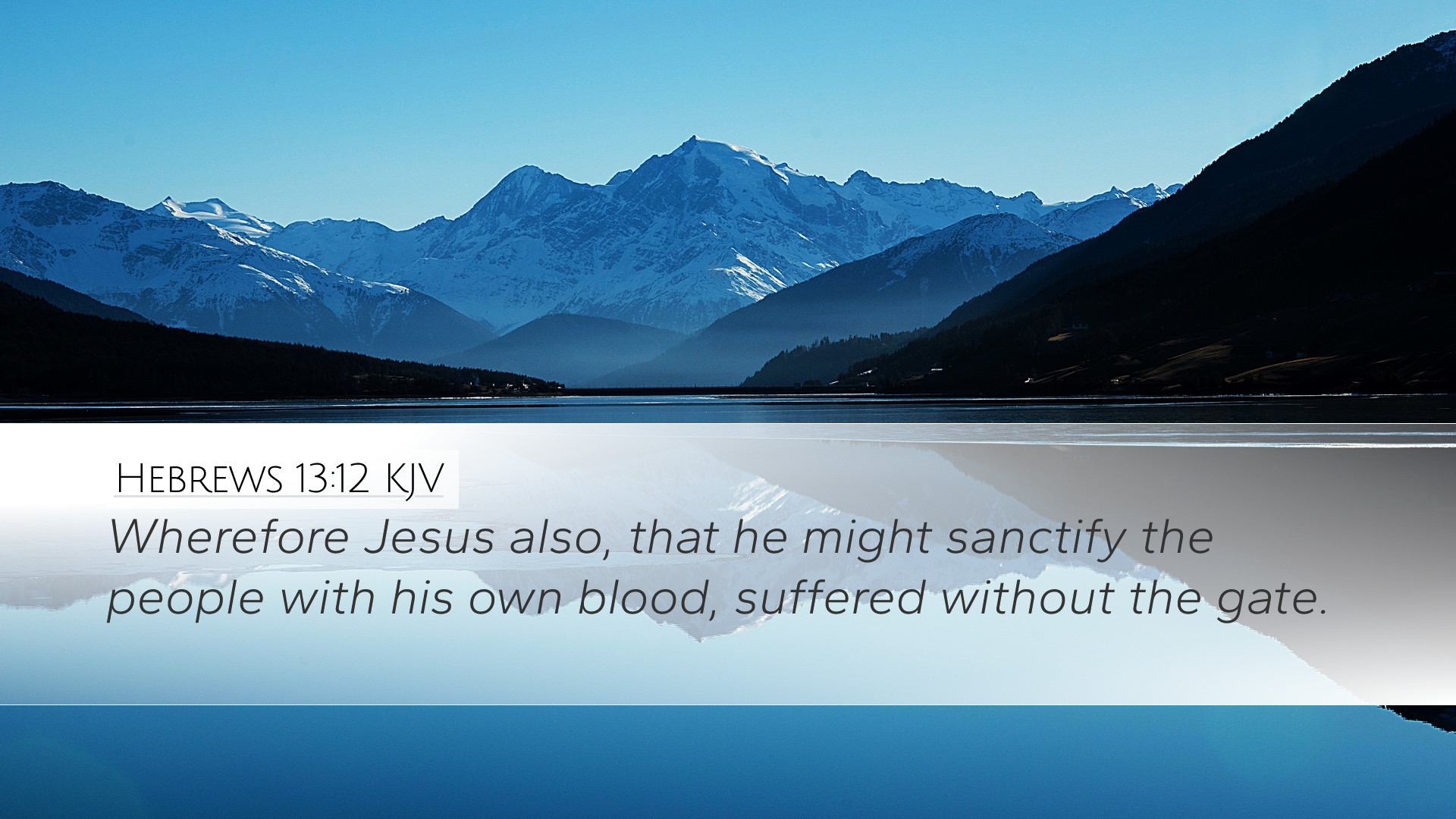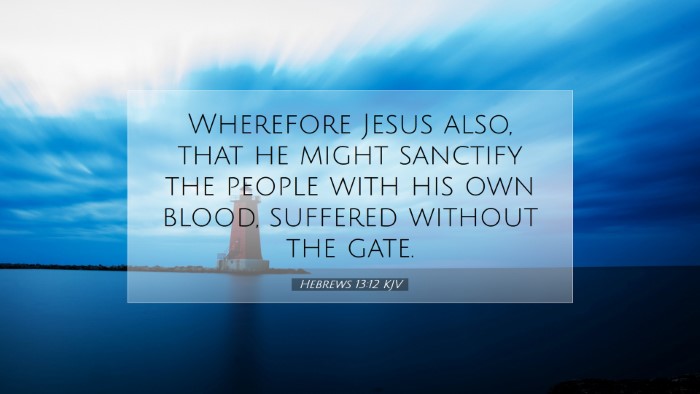Hebrews 13:12 Commentary
Verse Text: "Wherefore Jesus also, that he might sanctify the people with his own blood, suffered without the gate."
Introduction
This profound verse from the Book of Hebrews encapsulates the essence of Christ’s sacrificial work and its implications for believers. It highlights key themes of sanctification, suffering, and the fulfillment of Old Testament types. In this commentary, we shall explore insights from public domain commentaries by Matthew Henry, Albert Barnes, and Adam Clarke to deepen our understanding of this scripture.
Contextual Background
The Epistle to the Hebrews is written to a group of Jewish Christians who were facing persecution and were tempted to revert back to Judaism. The author, whose exact identity remains uncertain, emphasizes the superiority of Christ over the old covenant and sacrificial system. In this context, Hebrews 13 serves as a conclusion to the epistle, urging believers to stay steadfast in their faith.
Exegesis of the Verse
This verse outlines a stark theological truth regarding Jesus’s role as the ultimate sacrifice. Here are key insights:
- Jesus’ Purpose: The phrase "that he might sanctify the people" indicates that Christ’s suffering had a specific purpose – to consecrate and make holy those who believe in Him. Matthew Henry emphasizes that sanctification is not merely about being set apart, but also involves transformation into a state of holiness.
- The Nature of His Suffering: The reference to suffering "without the gate" draws from the imagery of the sacrificial system in the Old Testament. Albert Barnes explains that animals sacrificed for sin were often taken outside of the camp, symbolizing the bearing of sin and shame. This reinforces the idea that Christ bore our guilt and transgressions outside the Jewish religious structures.
- The Significance of Blood: The words "with his own blood" underline the vital importance of Christ’s atoning sacrifice. Adam Clarke notes that blood is representative of life, and thus Christ offered His life for humanity. This brings an invaluable depth to our understanding of redemption – it was not merely a physical death, but a substantive act of love and obedience.
Theological Implications
Hebrews 13:12 carries profound theological implications for understanding the nature of salvation and the Christian life:
- Sanctification: The call to holiness is central to Christian life. As highlighted by Henry, believers are to live in the light of the sanctifying work of Christ. This transformation is both positional and experiential, positioning believers as saints and empowering them towards godliness.
- Enduring Suffering: Just as Christ suffered, followers of Christ are called to endure hardships. Barnes reflects on the reality that suffering is an integral part of the Christian experience, as believers are called to share in Christ’s sufferings. Understanding that suffering can be redemptive is crucial for believers in times of trial.
- Faith and Community: The repeated encouragement throughout Hebrews is to consider the community of faith. Clarke notes that Christ’s sacrifice forms the basis for the church’s identity and mission, calling believers to support one another and to keep pointing to Jesus as the ultimate source of hope and sanctification.
Application for Believers
As we reflect on Hebrews 13:12, there are several meaningful applications for pastors, students, theologians, and scholars:
- Encouragement in Trials: Pastors can draw from this verse to encourage congregants experiencing hardships. Promising that their suffering aligns with Christ’s suffering provides hope and strengthens faith.
- Teaching Sanctification: For students and teachers of theology, this verse serves as a vital part of teaching about the sanctification process and the role of Christ’s sacrifice. Understanding these concepts is essential for biblical teaching and preaching.
- Community Focus: The call to remain part of a community that reflects on the significance of Christ’s sacrifice fosters unity and accountability amongst believers, making collective worship and support all the more meaningful.
- Holistic Understanding of the Atonement: The insights regarding Christ's blood and suffering remind scholars to maintain a holistic view of atonement that encapsulates themes of love, sacrifice, and the fulfillment of Old Testament prophecies.
Conclusion
Hebrews 13:12 serves as a powerful reminder of Jesus’s sacrificial work and its significance for the believer's life. Through the wisdom of public domain commentaries, we have gleaned insights that call us to deeper faith, holiness, and community in light of Christ’s suffering. As we apply these teachings, may we continue to grow in our understanding and embodiment of the gospel.


